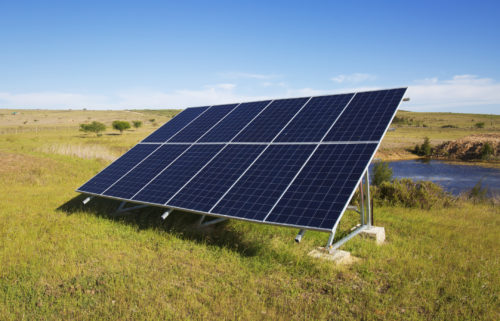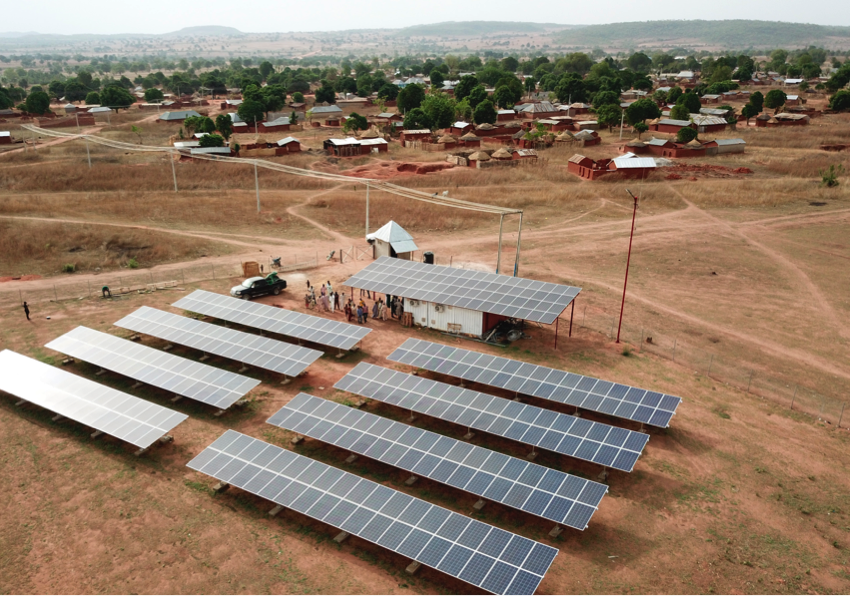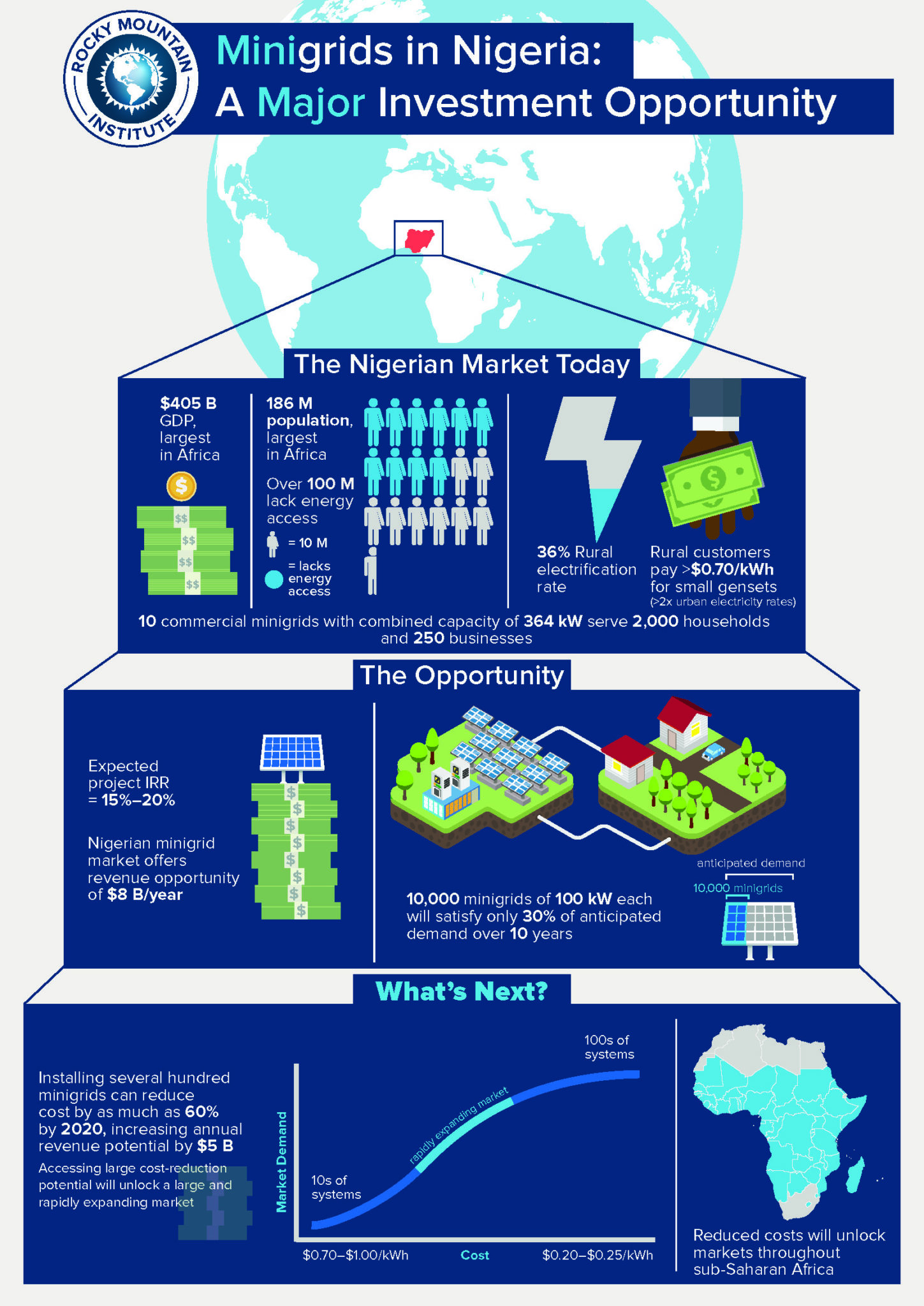
Reliable and Affordable Electricity for Nigeria: Growing the Minigrid Market
The vast majority of Nigerians today lack access to reliable and affordable electricity. From factories to schoolrooms, the power situation hampers development throughout Nigeria, especially in rural areas of the country. The Nigerian Economic Summit Group and RMI’s new report, Minigrid Investment Report: Scaling the Nigerian Market, discusses the opportunity for minigrid systems—stand-alone power generation and distribution systems that provide electricity to multiple customers—to address rural electrification needs. Minigrids can provide reliable and affordable energy to help factories manufacture, students study, and the Nigerian economy reach its full potential.
In only ten years’ time, investors and other stakeholders can transform Nigeria’s rural areas by introducing clean and affordable minigrids to provide energy access. Our research finds that we can reach this potential by building on existing groundwork and taking just a few key actions across the value chain. The Minigrid Investment Report discusses opportunities for growing the market and tapping into a revenue opportunity of up to US$8 billion per year.
A necessary solution
Today in Nigeria 65 percent of the population—over 100 million people—does not have access to reliable electricity. The situation is even more dire in rural areas, where only 36 percent of inhabitants have access to a centralized power source. While demand for rural electrification is increasing, distribution companies are unable to provide sufficient power to rural areas due to low generation capacity and underdeveloped transmission and distribution networks. The market is ripe for rural electrification, and minigrids offer a cost-effective opportunity to do just that.
Minigrids offer an innovative yet practical solution to rural electrification challenges. They can circumvent many of the problems with electricity from the centralized grid, while providing cost-effective power. Today, tens of thousands of communities in remote regions of Nigeria can be cost-effectively served by minigrids while providing investors a good return on investment.
What is a minigrid in Nigeria?
Minigrids, according to the Nigerian Mini Grid Regulation, are stand-alone power generation systems of up to 1 MW capacity that provide electricity to multiple consumers through a distribution network. Although several dozen minigrids currently exist in Nigeria, only about 10 of these are privately developed and financially sustainable. More specifics about operating commercial minigrid projects are provided in the Minigrid Investment Report.

Commercially viable
In writing the Minigrid Investment Report, our team collected and analyzed data on 10 commercial minigrid projects. These projects demonstrated strong business models (minigrids are increasingly financed with more commercial investment and less grant funding), robust system technology, and strong customer buy-in. Throughout the country, there is high potential for minigrid success.
As the most populous country in Africa with 186 million people, Nigeria is well positioned to support a boisterous minigrid market due to its active economy and high demand for electricity. Minigrid systems in Nigeria can easily reach a load of several hundred kW, an appealing scale that is greater than many minigrids currently operating elsewhere in sub-Saharan Africa. Greater productive use of electricity—one indicator of Nigeria’s strong economy—also means that Nigerian communities can support commercially viable minigrid systems through high daytime power demand that leads to greater system capacity utilization.
Customers in Nigeria are also clearly able to pay for power. Today, rural consumers pay a minimum of $0.71/kWh—and often much more—for alternative sources like small-scale diesel/petrol generation. RMI estimates current minigrid costs at a competitive $0.60–$1.00/kWh. With prepay models, collection rates are high and the collections process relatively simple. In addition, we believe costs can be reduced by up to 60 percent by 2020, further unlocking market potential.
In a country with strong political influence, support for minigrid development from the federal government is a must. The Nigerian Ministry of Power is committed to rural electrification and is promoting minigrids throughout the country. A strong Rural Electrification Agency and minigrid regulation further back minigrid developers in creating financially sustainable systems and protect them against larger utilities.
Opportunities for scaling the market
Although minigrids are already being successfully implemented in rural communities, acting on several key opportunities would strengthen the market and allow more rapid growth. For instance, roadblocks like difficulty accessing affordable finance and unpredictable import duties can have significant effects on the ease of doing business and sustainability of minigrid systems. In the Minigrid Investment Report, we highlight key recommendations through which different stakeholders can take action to promote market development.
Key recommendations for investors and donor partners include:
- Support efforts to increase affordability and viability of finance
- Provide partial grants and operational subsidies to speed market growth while retaining developer ownership of systems
- Create a minigrid finance consortium to spread the risk of minigrid investment
- Coordinate cross-sectoral demand stimulation through agricultural and other development programs
A market ready to bloom
The Minigrid Investment Report presents a clear pathway to scale minigrids in Nigeria, where the market is taking off. Innovative minigrid models are already being tested today, and with a strong business case already demonstrated, Nigeria is rapidly becoming a global hub for minigrid development. By acting now, the minigrid community can work together to hone the business case and grow the market. Those supporting early market development will gain an early market share in an industry that is expected to electrify tens of thousands of communities, hundreds of thousands of small businesses, and millions of individuals in Nigeria alone.
Image courtesy of iStock.
